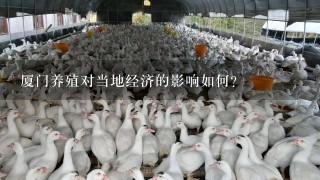厦门养殖对当地经济的影响如何?

Answer:
Positive Impacts:
- Employment generation: The aquaculture industry creates jobs in various sectors, including fishing, processing, transportation, and tourism.
- Income generation: Fishers and aquaculture businesses generate income for local communities and families.
- Foreign exchange earnings: The export of seafood products can generate foreign exchange earnings for the country.
- Food security: Aquaculture can contribute to food security by providing a reliable source of protein and other seafood resources.
- Cultural heritage: The aquaculture industry is an integral part of the local culture and heritage.
Negative Impacts:
- Overfishing: Unsustainable fishing practices can deplete fish stocks and threaten the sustainability of the industry.
- Environmental degradation: Aquaculture activities can generate waste and pollution, which can harm the environment and human health.
- Competition with wild fisheries: Aquaculture can compete with wild fisheries for resources, such as fish and shellfish.
- Social conflict: Conflicts can arise between local communities and aquaculture businesses over access to resources and livelihoods.
- Health risks: Aquaculture products may contain harmful bacteria or parasites, posing health risks to consumers.
Overall Impact:
The positive and negative impacts of aquaculture on a local economy can vary depending on factors such as the management practices, technology used, and local conditions. However, when managed responsibly, aquaculture can be a valuable economic driver for coastal communities.
Additional Considerations:
- The impact of aquaculture on a local economy can also depend on the specific location, resources available, and existing economic activities.
- Sustainable aquaculture practices, such as responsible fishing methods and environmental protection measures, can mitigate potential negative impacts.
- Government policies and regulations can play a crucial role in promoting the sustainable development of the aquaculture industry.





































































